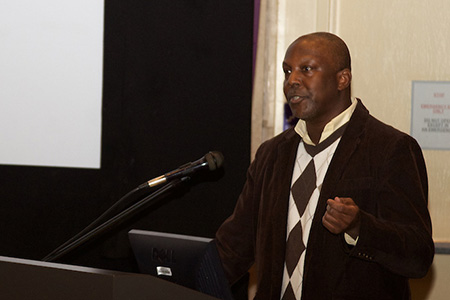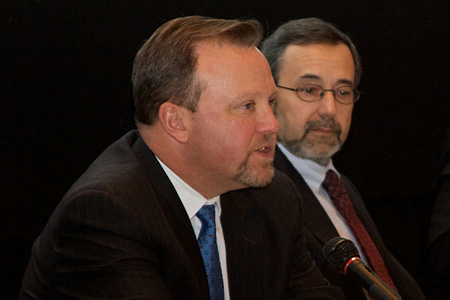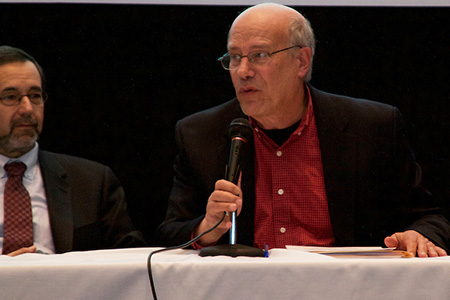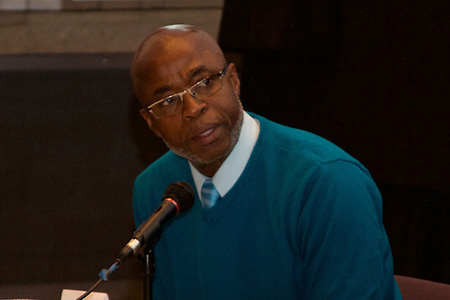Ebola impact costly for hospitals

Roger House, associate professor of American Studies in the Journalism Department, organized a discussion forum on Ebola, held in the Bordy Theater on November 13. (Photo by Nick Eaton ’17)
A discussion forum November 13 on the much-discussed Ebola virus had medical and media professionals laying out facts versus fiction while taking questions from students in the Bordy Theater.
Dr. Paul Biddinger, chief of emergency preparedness at Massachusetts General Hospital, outlined the costly measures the Boston hospital has taken.
“Just in the last eight weeks alone, we’ve probably spent $1 million between equipment purchases, training, and [renovations],” said Biddinger, who spoke about the cost with the Boston Globe this week. “That’s what it takes to care for one potential patient we hope to never have.”

Dr. Paul Biddinger of Mass. General Hospital and Dr. Larry Madoff of the Mass. Department of Public Health participated in the Ebola discussion event November 13. (Photo by Nick Eaton ’17)
“The epidemic—in quotes—in the United States has ended. That’s a total of nine cases,” said Jerry Lanson, associate chair of Journalism, referring to the last known Ebola patient in the U.S. being given a clean bill of health this week amid intense media coverage.
[Editor’s Note: On Friday, November 14, the Associated Press reported a new Ebola patient was being transported to the United States for treatment, increasing the number of total cases to 10.]
“It’s not really a threat here,” Biddinger said.
Dr. Larry Madoff, director of epidemiology and immunization at the Massachusetts Department of Public Health, provided a brief history of Ebola, saying the highly infectious disease was first discovered in rural, central Africa in the mid-1970s, and about 20 small outbreaks have occurred in rural areas since then.
“This time it struck in West Africa, so it went on for a while without being recognized,” Madoff said. “It crossed into urban settings, which was very unusual.”
Later in the discussion, Madoff criticized the United States and other developed nations for not helping stop the Ebola outbreak in West Africa sooner.
“We’ve known about this since March and only got involved in August, which I think is really shameful,” he said.

Madoff and Jerry Lanson, associate chair and associate professor in the Journalism Department, at the Ebola discussion event November 13. (Photo by Nick Eaton ’17)
The two doctors said the outbreak, which has killed more than 5,000 people and infected more than 14,000, accelerated because of the lack of healthcare infrastructure in the affected countries.
The likelihood of someone contracting Ebola in the United States is extremely low. One cannot contract the disease through air, water, or eating someone else’s food, according to the Massachusetts Office of Health and Human Services. The disease is contracted through touching an infected person’s bodily fluids; by using contaminated needles; or by touching infected animals, their body fluids, or ingesting their meat.
“What’s different about Ebola is patients produce a much larger volume of fluids,” said Biddinger.
Biddinger criticized U.S. politicians who ordered quarantines on health workers based on “non-scientific information,” saying it deters healthcare workers from volunteering in Africa, where 18,000 additional workers are needed. “There’s been a lot of misinformation out there.”
Roger House, associate professor of American Studies, organized the discussion event because he thought the Ebola outbreak could be used as a “teachable moment.”
“I lived through the HIV/AIDS crisis of the 1980s and the SARS outbreak a decade ago,” House said. “I remember the sense of panic and consequences for targeted groups.”
Another panelist was Sesay Johnson, executive director of The Liberian Community of Metro Boston, who said Liberians across the country have felt some stigmatization, but said the Boston area community has been generally supportive.
He also said his organization has reached out to its community members to give them advice on ways to communicate with family members in Liberia who may be affected by the Ebola outbreak.

Sesay Johnson, executive director of the Liberian Community of Metro Boston, at the Ebola discussion November 13. (Photo by Nick Eaton ’17)
One question for Lanson, the Journalism associate professor, was about why most of the American media coverage has focused on isolated events in this country. Lanson agreed, but pointed out that some “national print media publications have done a good job covering the story.”
He pointed to the New York Times, which published in-depth coverage early in the crisis, and a recent profile piece on two boys receiving treatment in Africa.
“Overall, the media could tell the story in a more honest way instead of boosting ratings,” Lanson said, “and not give equal weight to people…who pour gas on the flames.”
Video of the entire event will be posted next week to victorystride.com.
Categories